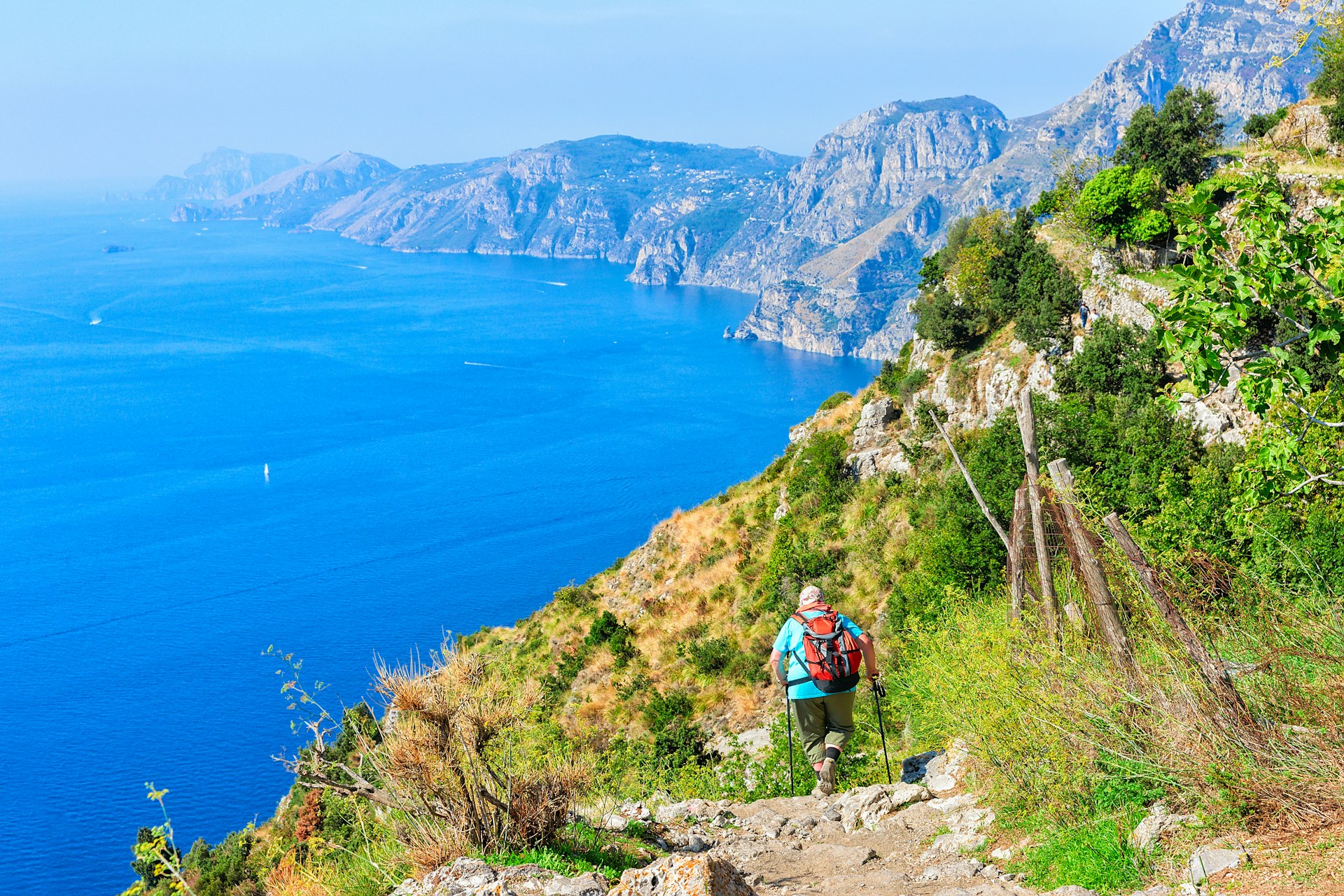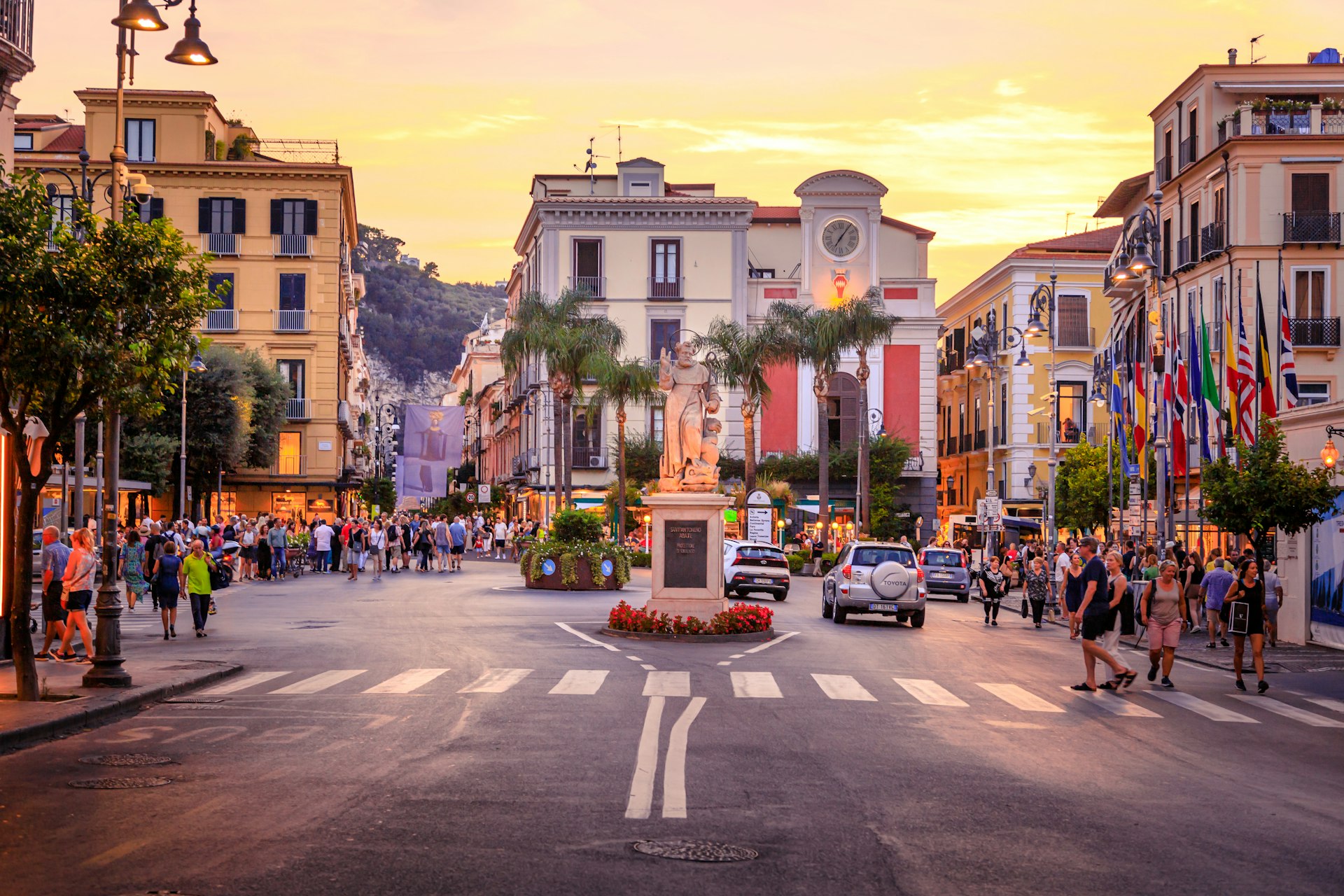The Amalfi Coast – where glamorous yachts crowd coastal inlets and nights at its bloom-draped hotels can start at €350 – is Italy at its most luxe.
It’s hard to believe that before the 20th century, this 50km (31-mile) stretch of dramatic cliffs and lemon groves was just a string of poor fishing villages. Thanks to the writers and filmmakers who immortalized its beauty, palatial seaside hotels cropped up seemingly overnight, celebrities flocked to its shores and the Amalfi Coast-as-influencer was born.
In addition to super expensive accommodations, expect bloated tourist prices at restaurants and cafes, where meals will run you €50 on average and an espresso can cost upwards of €5 (compared to €1 in most of Italy). And yet, the Amalfi Coast is irresistible. Here are our tips on stretching your humble euro so you can enjoy this stunning when you’re not part of the glitterati.
A guide to daily costs in the Amalfi Coast
- Dorm bed in a hostel: €50–250
- Basic hotel room for two: from €50–350
- Self-catering apartment (including Airbnb): €50 and way, way up
- Single-ride bus ticket: €1.30
- Ferry ticket: €3 and up
- Espresso: €5
- Gelato: from €3
- Lunchtime sandwich: €3–8
- Pizza margherita: €7
- Three-course restaurant dinner for two: from €100
- A glass of wine: €5
Average daily cost: €300
Public transport is the most cost-effective way to get here…
…if you’re already in Italy, that is. Take a high speed Frecciarossa train to Naples, then a ferry (€30 and up) or bus (from €1.30) to your chosen Amalfi Coast town. It’ll take about twice as long as a taxi, but sure beats paying upwards of €100.
Aim to come in the shoulder season
Summer is undoubtedly the most popular time to visit – and the most expensive. Worse, every square meter crawls with tourists and the heat soars upwards of 32°C (90°F), turning the region into a sweaty hellscape. August is the absolute worst moment, when vacationing Italians join the fray and many businesses and tourist sites will be closed. The madness reaches its miserable peak at Ferragosto – the Italian summer solstice festival, celebrated on August 15. Instead, plan your trip for the shoulder season (September and October, March to early June), when most tourists are gone and the weather is glorious. Prices start coming down after August 15, and you’ll be rubbing shoulders mostly with locals.
You can also find good deals during the off-season (November to March). It’ll be too cold for sundresses, but the Amalfi Coast’s villages and hikes are still exceptionally beautiful during this time. Keep in mind, however, that the region goes into hibernation in colder months, with public transit and restaurant service greatly reduced. Many hotels shut down until Easter, so while you’ll find cheaper stays (with prices around 30% less than peak season), your options will be limited.

Get around by public transport
Yes, it’s maddeningly spotty and in peak season, you’ll be (literally) fighting for space on board. But at €1.30 for a single-ride ticket (compared to €30 a day for a car rental plus €1.80/L for petrol), if you’re on a budget, taking public transport on the Amalfi Coast is a no-brainer. With careful planning, the region’s extensive bus and ferry network can get you wherever you need to go, from the coastal villages to the mountain towns like Ravello and Agerola, the starting point for the Path of the Gods hike.
Amalfi, Sorrento and Positano have the most ferry and bus connections. The ferries are the single best option for getting between coastal cities, as they’re faster and far less crowded than buses. In either case, be sure to check the transport schedule carefully – in shoulder and off season, service is drastically reduced, and in peak season when buses will often be too packed to stop, it’s helpful to know when the next is coming. Buy bus tickets at tobacconists, directly onboard or download the UnicoCampania app to get bus schedules in real time and buy your ticket online. Snagging ferry tickets online at sites like Traghetti.com is recommended to avoid queues at the port.
If you’re on a budget, forget about staying in Positano
There’s no way around it: accommodations on the Amalfi Coast are pricey, and during peak season, they’re astronomical. Yes, you’ll see inexpensive lodgings in the inland mountain cities, but their distance from literally everything ultimately makes them an inconvenient choice. Instead, try the villages between Amalfi and Salerno, where you’ll find (slightly more) manageable costs of €100–140 in peak season and €40–80 in off season. For example, tiny Atrani is just 600m (1969ft) away from Amalfi yet accommodations here are often cheaper, allowing you the same convenience and beauty for less. Head east from Amalfi’s port through the Luna Rossa car park and then over the bridge to get lost in the snaking alleyways that inspired some of Dutch artist MC Escher’s labyrinthine works. Going further east along the coast, you’ll find Praiano – equidistant between Positano and Vietri sul Mare and a backdoor entrance to the Path of the Gods hike if you’re prepared to climb up 1000 steps – and the fishing villages of Maiori and Minori, just 5 and 10 minutes away from Amalfi by ferry and bus.
And if you truly have your heart set on visiting the Amalfi Coast’s historic luxury hotels, simply drop in for an aperitivo at their bars and terraces. A sunset Aperol Spritz at Positano’s Hotel Le Sirenuse costs way less than a room.

Find deals in Sorrento, a little further off the Amalfi Coast
Sorrento may technically be part of the Sorrento Peninsula, but it’s close enough to the Amalfi Coast to be a viable hub and be far enough away to offer some good deals. Sorrento is also a major ferry and bus crossroads, getting you to Positano and other coastal cities for glorious day trips.
Seek out some of the Amalfi Coast’s cheap eats
Scrimping on food while in Italy is sacrilege, especially on the Amalfi Coast, which offers an incredibly rich traditional cuisine as well as world-class restaurants. Balance your food budget by alternating gut-busting meals with lighter fare and remember: you don’t have to pig out to eat well. Look out for these bargain things to eat.
Enjoy pizza in its (almost) birthplace from €5
Pizza – the quintessential Italian cheap eat – was invented just a few dozen kilometers away in Naples, and the entire region reaps the benefits. Pizzerias will also usually serve fritti, fried snacks like arancini or crochette di patate (potato croquettes), for a couple of euros a pop.
Grab a panino to go from €5
In Italy, some of the best culinary experiences can be held in one hand. Visit a caseificio (dairy), salumeria (salami shop) or paninoteca (sandwich shop) to get a gut-busting panino to go, made with rustic breads and heaped with local salume, cheeses and pickled vegetables. A fat panino alla caprese – a sandwich with tomato, basil and succulent mozzarella – is a regional specialty you can’t pass up.
Take a sweet break with pastries and gelato from €3
Two of Italy’s most delicious inventions are also the least expensive, even on the Amalfi Coast. Sal de Riso in Minori and Pasticceria Pansa in Amalfi are two of the region’s most famous pastry shops, while Pasticceria Sandra in Vietri sul Mare is an under-the-radar delight. Look for traditional regional pastries like the delizia di limone (lemon cream-filled sponge cake), sfogliatelle and baba’ au rum (rum-soaked sponge cake). And when ordering gelato, be sure to ask for panna (whipped cream) on top.
Fill up for less with an apericena from €15
Do as the locals when you’re hungry but can’t blow your budget: head to apericena. Apericena – a portmanteau of aperitivo (aperitif) and cena (dinner) – is a glorious mega happy hour spread, featuring quality taglieri boards heaped with hearty goodies like local charcuterie, cheeses, pizza and fritti (fried treats) like montanara, fried dough topped with tomato sauce, basil and cheese. Wash it all down with a stiff Negroni.
Enjoy traditional food for less at a trattoria from €15
Sit-down dining options in Italy range from pricey ristoranti (restaurants) to humble trattorie, which is where you’ll find traditional home cooking with prices to match. Typical trattoria dishes in this region include gnocchi alla sorrentina, spaghetti alle vongole and parmigiana di melanzane.
Hit up the pubs from €10
Bar food may be the last thing on your mind in Italy but Italian gastropubs help people eat for cheap, serving burgers, sandwiches, steaks, pizza and giant plates of pasta. The quality might not be elite, but you’ll often catch live music and get to feel like part of the local zeitgeist. Don’t forget, the Amalfi Coast is expensive for Italians, too.
